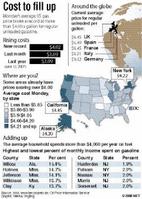Wilberne Persaud, Financial Gleaner Columnist
Persaud
This week oil hit US$140 per barrel, regular gas clipped US$4 average across the United States of America, both records.
In Asia, Europe and the Middle East, unrest accompanied high fuel prices. In the meantime 'futurists' continue to warn of possible wars over oil and water.
Here are a few obscure facts: 1 kg of bread requires 1,000 litres of water for its production; 1 kg of beef, 15,000 litres. And the development assistance committee of the Organisa-tion of Economic Cooperation and Development (OECD) - the rich countries' club - in one of its influential 'issues briefs' argues that "water scarcity, in combination with low economic development and shortfalls in political governance and other mechanisms in managing tensions peacefully, may lead to instability - threatening - lives and livelihoods."
This is diplomatic speak for conflict and eventually war.
Some make similar arguments about oil.
Bad policy
"It is politically inconvenient to acknowledge what everyone knows: the Iraq war is largely about oil." Who is this radical anti-American nutcase you ask? Well, this isn't. These words are from the man, almost universally praised while in office but, recently blamed for bad policy, who served for 18 years as boss of the US Federal Reserve. These words are from Alan Greenspan's memoirs.
While we can't get to the bottom of the issue of the root cause and solution of the world energy crisis in a few words, we might shed some light on a few central issues. First is that world development in capitalist mode and reasonably free inter-national trade (read globalisation) alongside governance by individual and independent nation states would inevitably lead to this situation.
With China, India and Brazil ramping up economic production as Wal-Mart and US demand surges, their middle class grows and becomes personal automobile driving, meat eating, and cellphone-using human beings.
This puts a huge stress on oil demand. Oil is also an important input in production of food. So the spiral of costs and price increase takes hold.
A host of reasons are given for the situation facing us. When we consider them we might want to say the good old Jamaican retort "everything is everything" fits well. The list of reasons is long. Consider a few:
The oil companies are greedy raking in super profits.
Bush's wars paid for by credit card.
Speculators are rampant.
Futures markets are overwhelmed by new petro-dollars.
First to the big oil companies. It takes, let us say, seven years to bring new oil extraction and refining facilities' output to market. Over the past decade no major oil company could have risked making capital expenditures based on expectations of anything but oil at US$40 to US$60 per barrel. Anyone that did otherwise would have been pummeled by that genie we call the 'market'. Wall Street would have demolished them.
What of the 'speculators are rampant' argument?
To this there might be some merit but this certainly is not an overriding contributory factor. In 1973 the OPEC cartel was the villain. Hindsight suggests it did the world a favour. Cheap oil is like that gateway illegal substance and full blown addiction.
Space heating
Post 1973 reality sees space heating in the United States much less dependent on oil. It saw a movement to higher fuel efficiency standards soon to be abandoned for the SUV and the woes their owners currently face. But speculators could not have single-handedly kept the price high.
The underlying fundamentals tell us we are in a new situation.
Fighting wars on a credit card? While some fight others shop. This increases US deficits, both budget and trade, but reduces an already low savings rate. China accumulates US Treasury securities by the billion and increasing petrodollars go Middle East bound. Sovereign funds and others seek, indeed must find a home. Is investment in US real estate and other allowed areas speculation? Probably not.
So with over 90 per cent of our energy demand satisfied by oil imports, where are we, Jamaica, in all of this? Some say behind the eight ball. Perhaps true, but a skilful player has a jump shot, a spinning curve off the rebound.
Not easy to accomplish. Part of our solution is simple: improve public transportation and its infrastructure; restart the railway; move workers from Portmore to Kingston by sea; leave the personal automobile for week-ends only; make energy efficiency and conservation a winner by real tangible tax breaks; do so too for wind and solar power. But to do these we must combat the crime explosion.
We expect perfection and dominance in the 100 metres. Can similar results be generated elsewhere? Is everything really everything?

wilbe65@yahoo.com

